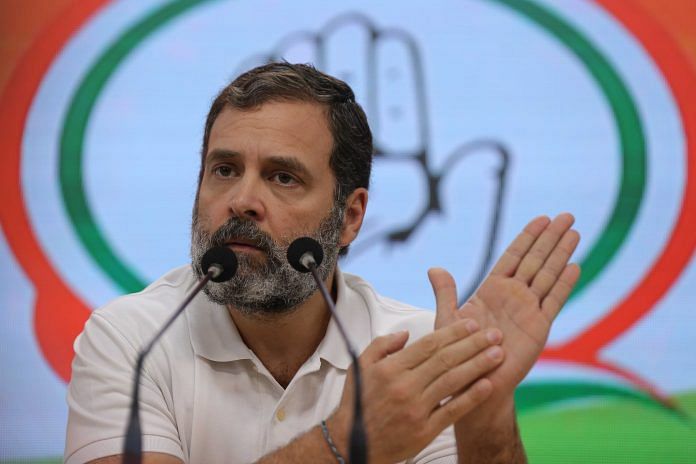
Thank you dear subscribers, we are overwhelmed with your response.
Your Turn is a unique section from ThePrint featuring points of view from its subscribers. If you are a subscriber, have a point of view, please send it to us. If not, do subscribe here: https://theprint.in/
Rahul Gandhi’s conviction in a defamation suit and subsequent disqualification from the Lok Sabha has dominated news headlines in the past week. Aside from the political clamor, it is unsurprising, then, that there has been a fair amount of discussion about whether the laws and rules were justly applied. However, this has also been a missed opportunity to talk about the larger state of free speech in this country.
In the immediate context of Rahul Gandhi’s case, the swift disqualification, regardless of whether it was politically motivated or not, seems appropriate given the long list of precedents. Whether the conviction under the defamation law was appropriate, however, is a matter best left to legal experts, especially since similar cases in the past have played out in different ways. It is, therefore, surprising that Rahul Gandhi did not apologize in front of the Surat Court that convicted him (based on remarks made by Prahlad Joshi and his own interaction with the press), which was viewed as an opportunity provided by the court for a more favorable ruling. In any case, the more interesting question, in my view, is not whether the defamation law was appropriately used, but why we have a criminal defamation law in the first place.
Criminal defamation is just one of several laws used to suppress free speech in the country. Another notorious one is the sedition law. Going by past data, less than 15% of defamation and 4% of sedition lawsuits result in convictions, which already brings the utility of these laws into question. In any case, the existence of these laws in itself severely undermines free speech. In addition, we have laws that virtually (if not explicitly) punish blasphemy and hate speech, and an overbroad interpretation of contempt of court in many instances that penalizes criticism of the judiciary which would be considered perfectly acceptable in many other democracies.
So why do we not have a much greater degree of free speech? A common argument is that Indians simply aren’t “ready” for this level of freedom, suggesting that incendiary speech would lead to a deterioration in the law and order situation. Apart from being patronizing, this argument also serves as a convenient excuse for the state to not fulfill its duty of maintaining law and order. Regardless, there is admittedly a kernel of truth in this argument. The sad part, however, is that even as state capacity has grown, our freedom of speech has not. Indeed, since independence, the country has probably seen a dip in the level of lawfully permitted speech.
The reasons for this are numerous. First, Indians do not particularly care about free speech. Although there is no objective data to show this, both anecdotal and secondary data seem to support this hypothesis. Second, governments (at all levels) are not interested in enhancing free speech in India. This is both a reflection of popular opinion as well as the nature of government itself, given that it is in the selfish interest of a government to be able to suppress critical speech. Indeed, this is regularly done, and although most cases eventually are thrown out in the courts, the judicial process becomes the punishment. Finally, our institutions do not believe that Indians deserve more free speech. The legislature has naturally acted as an arm of the government to restrict free speech. The first amendment to our Constitution (moved by Jawaharlal Nehru) limited the freedom of speech and expression guaranteed by Article 19 by adding vague restrictions like “decency and morality.” The judiciary might seem better, given that it regularly dismisses cases brought under the aforementioned anti-free speech laws, and has been particularly careful with the sedition law recently. However, over the decades, it seems to have generally bought the argument that Indians are not ready for more free speech, even as Indian society and state capacity have changed. In Subramanian Swamy v Union of India, the Supreme Court upheld the validity of criminal defamation. The current chief justice has in the past said that hate speech is unacceptable. Following the murder of the Udaipur tailor last year, a Supreme Court bench remarked that Nupur Sharma’s “loose tongue” had set the country on fire, a comment which seemed to blame bad speech instead of violent action, even if unintentionally. The Supreme Court has also used contempt of court to suppress free speech, such as against Prashant Bhushan in 2020 for merely mocking the then-CJI in a tweet.
Given the lack of interest among its people and institutions, I am not particularly optimistic about the prospect of absolute free speech in India. We should, however, not miss an opportunity to have a conversation about the state of free speech in this country, and an enhancement, even if incremental, in our freedom of speech and expression.
Also read: SubscriberWrites: India’s ‘system’ has failed but illusion of leadership lingers
These pieces are being published as they have been received – they have not been edited/fact-checked by ThePrint.

COMMENTS